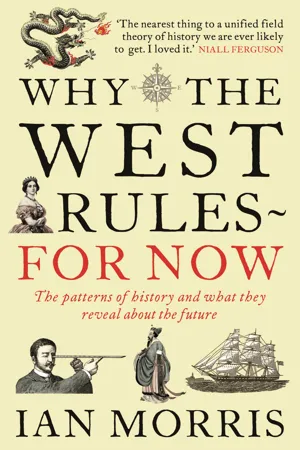
Why The West Rules - For Now
The Patterns of History and what they reveal about the Future
- 608 pages
- English
- ePUB (mobile friendly)
- Available on iOS & Android
Why The West Rules - For Now
The Patterns of History and what they reveal about the Future
About this book
Why did British boats shoot their way up the Yangzi in 1842, rather than Chinese ones up the Thames? Why do Easterners use English more than Europeans speak in Mandarin or Japanese? To put it bluntly, why does the West rule? There are two schools of thought: the 'Long-Term Lock In' theory, suggesting some sort of inevitability, and the 'Short-Term Accident' theory. But both approaches have misunderstood the shape of history.Ian Morris presents a startling new theory. He explains with flair and authority why the paths of development differed in the East and West and - analysing a vicious twist in trajectories just ahead of us - predicts when the West's lead will come to an end.'Here you have three books wrapped into one: an exciting novel that happens to be true; an entertaining but thorough historical account of everything important that happened to any important people in the last 10 millennia; and an educated guess about what will happen in the future. Read, learn, and enjoy!' Jared Diamond'A great work of synthesis and argument, drawing together an awesome range of materials and authorities to bring us a fresh, sharp reading of East-West relationships.' Andrew Marr
Frequently asked questions
- Essential is ideal for learners and professionals who enjoy exploring a wide range of subjects. Access the Essential Library with 800,000+ trusted titles and best-sellers across business, personal growth, and the humanities. Includes unlimited reading time and Standard Read Aloud voice.
- Complete: Perfect for advanced learners and researchers needing full, unrestricted access. Unlock 1.4M+ books across hundreds of subjects, including academic and specialized titles. The Complete Plan also includes advanced features like Premium Read Aloud and Research Assistant.
Please note we cannot support devices running on iOS 13 and Android 7 or earlier. Learn more about using the app.
Information
Table of contents
- Cover Page
- Title Page
- Copyright Page
- Dedication
- Contents
- List of Illustrations
- Introduction
- Part I
- Part II
- Part III
- Appendix: On Social Development
- Notes
- Further Reading
- Bibliography
- Acknowledgments
- Index
- Footnotes